Résultats de recherche de titre
Articles 1 à 20 sur 18127

Brand Real: How Smart Companies Live Their Brand Promise and Inspire Fierce Customer Loyalty
Par Laurence Vincent. 2012
Brand Real is a business strategy guide for making a brand’s promise stand up at every customer touch point. Packed…
with proven, repeatable management practices, the book shows how to establish a clean brand architecture while avoiding the needless complexity that has tripped up many promising companies. Author Laurence Vincent presents cautionary tales of supposed brand superstars as well as instructive case studies of genuine brand giants like American Express, Apple, Cisco, Google, Qualcomm, Virgin, and others. Readers will learn how to connect the outward-facing elements of their brands--logos, advertising, imagery, communications--directly to the core elements of business strategy. Most importantly, they’ll explore the correlation between a succinct, efficient brand and powerful, lasting connections with their customers.Companies are becoming increasingly creative in their branding strategies--building identities ranging from the warm and fuzzy to the ultra cool and edgy. But it seems many of these enterprises forget that a brand, at its heart, is a promise to deliver. Brand Real ensures your customers’ experiences lives up to that promise and that their loyalties stay with you.
Explore the Bible alongside daily insights from pastor-teacher Dr. John MacArthurFor more than 50 years, Dr. John MacArthur has helped…
Christians gain greater clarity and insight into Scripture. Now you can read through the Bible in a year while learning from wisdom gleaned from a lifetime of study with The MacArthur Daily Bible. This Bible offers an achievable approach to reading the entire Bible with readings from the Old and New Testaments, Psalms, and Proverbs for each day of the year. Combined with insights drawn from The MacArthur Study Bible, you will gain greater clarity and understanding as you read.Features include:The complete New King James Version of the Bible presented with daily readings from the Old and New Testaments, Psalms, and ProverbsDaily notes from Dr. John MacArthur drawn from the MacArthur Study Bible, Second Edition, to help you better understand key truths in Scripture52 key passages of the Bible for study and memorizationDaily use Bible with devotional questions to improve your reading God&’s WordClear and readable 8.5-point text size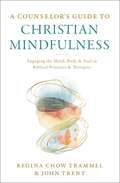
A Counselor's Guide to Christian Mindfulness: Engaging the Mind, Body, and Soul in Biblical Practices and Therapies
Par John Trent, Dr Regina Chow Trammel. 2021
Equips Christian counselors and therapists to confidently use mindfulness techniques with their clients in a way that is both practical…
and biblical. Accessing mindfulness is a therapeutic touchstone for a range of emotional issues, from mild distress to the treatment of trauma, but the term mindfulness has often left Christians wary. Stripped of Christlike spirituality, it sounds self-focused at best, and at worst like a fusion with modern pop-religions of the day.But the quality of mindfulness—of being fully present, aware of ourselves and our situation so that we can better respond to the chaos around us—is a profoundly biblical concept. And it can be used effectively by Christian counselors and healing practitioners.In A Counselor's Guide to Christian Mindfulness, Regina Chow Trammel (a clinical social worker) and John Trent (a marriage and family therapist) team up to offer training in mindfulness skills used in evidence-based practices, such as dialectical behavioral therapy, acceptance and commitment therapy and mindfulness-based cognitive therapy. These therapies have been shown to be highly effective in the treatment of many mental health issues, blending elements of neuroscience, social science, and religious training.This book is the ideal resource to equip those in the helping professions to faithfully use mindfulness interventions both professionally and personally and includes:A historical and theoretical overview of Christian mindfulness and how it contrasts with other mindfulness-based practices.A practical guide for how to use mindfulness skills in counseling and therapeutic practice.A section addressing specific challenges or situations that your clients face.Dialogue scripts and contemplation exercises to adapt for your own work.The practice of Christian mindfulness can be effective in helping clients manage their intrusive and stressful thoughts, emotions, relationships, and challenges. This book fills a gap for Christian counselors and therapists who are eager for a resource that teaches mindfulness skills from a Christian and biblical perspective.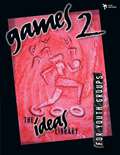
Games 2 (The Ideas Library)
Par Youth Specialties. 1997
Nearly 400 more wild, creative games for guaranteed fun! - Baseball and Kickball Games . . . The national pastime…
is hereby turned on its ear by more nutty variations than you can shake a Louisville Slugger at. Plus other diamond games, like kickball. - Swimming Pool and Lake Games . . . Whether your water is a pond, pool, or Puget Sound, we've got contests, activities -- even a spectator Water Carnival (see page 117). - Wide Games . . . Got a few acres and a few hours to organize, strategize -- and then use stealth and cunning to infiltrate enemy lines, smuggle contraband through customs, or detect (and dispatch) aliens? These adventure games are perfect for camps and retreats! - Golf Games . . . You don't need manicured courses, motorized carts, or polyester pants. What you do need are people willing to golf with marshmallows, rubber bands, hula hoops, and croquet mallets. - Frisbee Games . . . Portable, ubiquitous, and supremely cool, flying discs hold hours of entertainment for your group. In fact, why not plan an entire day of Frisbee games? Plus . . . A bevy of relay races, outdoor games especially for large and small groups, 30-some soccer and hockey games, alternative football games, and enough water games (including water balloon games) to give your group a sopping good summertime! Whether you're a youth worker or recreation director in a church, school, club, or camp -- Games 2 is brimming with notoriously wild, creative, and youth-group tested games!
Sweet as Apple Pie: Daily Inspirations for Healthy and Fruitful Living
Par Karla Dornacher. 2011
This fun, fresh book combines heartfelt devotions with a love for crafts, cooking, and country style. Both fans of Karla…
Dornacher’s work and new readers will be drawn to these hearty helpings of delightful art and inspiring words. They’ll enjoy “Today’s Apple” scriptures, “Chew on It” thoughts, and “Savor the Flavor” prayers, and the journaling areas will encourage them to explore the art of fruitful living in their own lives. Dornacher’s charming artwork has been licensed into a multitude of formats, including fabric, framed art, stationery, greeting cards, stoneware, calendars, scrapbook collections, and more.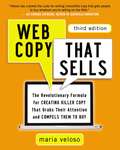
Just as technology is constantly evolving, author Maria Veloso approaches marketing communication from a posture of newer, faster, and more…
effective techniques.Veloso provides both timeless and cutting-edge methods to help content marketers achieve phenomenal success. With the rise of social networks, &“Twitterized&” attention spans, and new forms of video content, marketers&’ online sales techniques need an upgrade.In Web Copy That Sells, you&’ll gain tips for:crafting attention-grabbing, clickable, and actionable content;learn how to streamline key messages down to irresistible &“cyber bites&” for highly targeted Facebook ads and interactive web banners;discover the latest psychological tactics that compel customers to buy;and learn how to write video scripts that sell.Whether your focus is on web copy, email campaigns, social media, or any of the other latest and greatest opportunities for lead generation through digital marketing communication, these tips will help you pack a fast, powerful, sales-generating punch.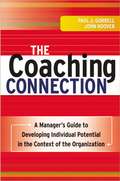
The Coaching Connection: A Manager's Guide to Developing Individual Potential in the Context of the Organization
Par John Hoover, Paul Gorrell. 2009
Traditional coaching methods have focused entirely on the individual--sometimes even at the expense of improving measurable business results for the…
company. Now, authors John Hoover and Paul J. Gorrell, both notable leaders and talent experts, show managers how they can use contextual coaching to ensure both individuals and organizations experience the highest probability for success. Contextual coaching uses a dual-focus systems approach to align coaching processes with the strategies, cultural imperatives, talent management systems, communication practices, and competency requirements of an entire organization. The Coaching Connection teaches readers how to apply this methodology by taking all of these factors into consideration within their own organizational context. When coaching initiatives are successful, individual and organizational interests become one. Including a 360-degree assessment covering the ten most essential skill sets of well-balanced and effective leaders, as well as systems for measuring and managing talent, The Coaching Connection helps companies improve both their people--and their bottom line results.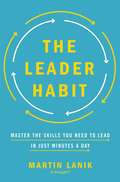
The Leader Habit: Master the Skills You Need to Lead--in Just Minutes a Day
Par Martin Lanik. 2018
In leadership as in life, only practice makes perfect. Habits are powerful, and The Leader Habit offers a simple, original approach to…
dramatically improving even our weakest areas.Routines quietly undergird large portions of what we do and how we function. Habit formation can speed success in the workplace as well--even in complex areas like leadership. Leadership training expert and bestselling author Martin Lanik spotlights 22 essential leadership abilities, breaking them down into a series of small, learnable behaviors.In The Leader Habit, you will find:Compelling evidence on how habits shape our lives, and how leadership is simply a series of habitsContent based on original research that looks at 795 leaders across the globe, identifying 22 essential leadership skills and 79 micro-behaviors that make up those skillsSimple exercises to turn effective leadership behaviors into ingrained habits, along with clear cues that tell you when to practice eachA Leader Habit Quiz that assesses 6 personality traits and points to behaviors that you&’ll find most rewardingTips for staying motivated, avoiding procrastination, and sustaining progressThe book's simple formula focuses on developing one skill at a time: sell the vision, delegate well, innovate often, empower others, overcome resistance, build strategic relationships, focus on customers, listen actively, negotiate effectively, and more.Many of us aspire to great leadership by consuming books and training. However, unless you intentionally reinforce the right behaviors, results are fleeting. The Leader Habit builds the "muscle memory" to turn leadership skills into lasting habits.
Do you have moments when you feel defeated, scared, or hopeless? Are you looking for a way to understand the…
work of the Holy Spirit and create a deeper relationship with Christ? Discover the power of the Holy Spirit in your life as bestselling author O. S. Hawkins leads readers on a 40-day journey from Easter to Pentecost in The Apostles&’ Code.In this affordable paperback resource, readers will:Embark on a 40-day journey, guided by O. S. Hawkins, to discover the power of the Holy Spirit in their livesEngage with a daily reflection accompanied by a Code word for the day, an encouraging Scripture, and a prayer The digital booklet is perfect for:Church distribution to members during Ascension, Bible study groups, and worship groupsIn-person and virtual discussions of the Holy Spirit and Ascension The apostles must have felt defeated when Jesus was crucified because they abandoned Jesus and fled. Yet just a few weeks later they couldn't help but boldly speak of the things they had seen and heard. What empowered them to be willing to lay down their lives for Jesus? It was the Holy Spirit who came to live in each of them at Pentecost. And He is the same Holy Spirit who lives in each of us who trust Him for our salvation.Feel the power of the Holy Spirit in your life today, and be filled with the promise that He will never leave you or forsake you.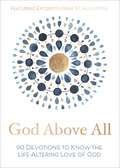
God Above All: 90 Devotions to Know the Life-Altering Love of God
Par Zondervan. 2020
We all yearn for greater contentment. We try new planners, new apps, new jobs, new diets, and new relationships hoping…
that one more change will finally make our lives feel right. But no matter what we do, the peace we seek feels out of reach. How can we find the meaning and purpose we long for? Fourth-century philosopher and theologian St. Augustine asked the same question.God Above All, compiled from St. Augustine&’s most-influential works, includes:90 devotions to learn the life-altering love of GodHow to change your heart and desire God above allAncient writings made accessible and applicable for modern readersShort excerpts from St. Augustine&’s works, such as Confessions and The City of GodPractical prompts to apply Augustine&’s insightsThis 90-day devotional is a heartfelt gift for:Men and women who want to experience life with fresh eyesReaders across all denominations and faith backgroundsAnyone who longs to grow in faith but doesn&’t know where to startFather&’s Day, birthdays, Christmas, and for anyone interested in learning more about St. Augustine&’s teachings about making God the center of allWhether you are seeking guidance in making God a priority in your relationships, your work, or your daily decisions, God Above All is the perfect book to inspire you to discover the delight of glorifying your Creator in every moment of your life.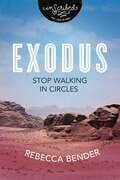
Exodus: Stop Walking in Circles (InScribed Collection)
Par Rebecca Bender. 2022
Lessons from the book of Exodus: learn how to stop walking in circles and rely on God's grace to show…
you the way to his good promise. Do you wonder if you'll ever get back on track after suffering a major setback or traumatic experience? Do you wonder—even secretly—if God actually does keep his promises? Or if his love is far-reaching enough, his plan detailed enough to include even your daily struggles, habits, and hang-ups?In this Bible study, Rebecca Bender takes study groups and individuals straight into the book of Exodus where the Israelites are wandering after their own tracks immediately after escaping from bondage and oppression at the hands of Pharaoh. God is trying to get them to the land of his promise, but they, like many of us, are frustrated by doubts, fears, and self-destructive habits...This study guide will equip you to:See Exodus in a new and relatable way that will help you better understand God and yourself.Understand the historical and cultural nuances of Egypt to give you fresh insight into this powerful story.Learn applicable tips from the children of Israel by understanding what they did right and what they did wrong in order to reach their goals.Move beyond your own past and into your promises.Get back on track after experiencing a major setback in life or enduring a traumatic event.God has called you out of bondage—to sin, to doubt, to defeat—and into his Promised Land that flows with his grace and truth.This study guide includes biblical and historical background insights, practical application, group discussion questions, and a memory verse for each chapter.Inscribed is a collection of studies that lead women to not just survive but thrive by encouraging them to immerse themselves in the Word of God.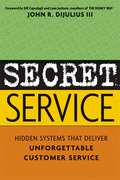
Secret Service: Hidden Systems That Deliver Unforgettable Customer Service
Par John DiJulius. 2003
All businesses have customers, but how many of them deliver unforgettably good customer service?Customer experience expert and author John R.…
DiJulius reveals the hidden systems of the few exceptional companies that do: what actions they take behind the scenes to consistently surpass customer expectations. These organizations reap the benefits of greater customer loyalty, exponentially expanded referral networks, lower employee turnover, and stronger bottom-line results.Packed with examples applicable to a wide range of industries, Secret Service provides practical, realistic ways to:Turn customer complaints into positive experiences,Use marketing to go deeper with existing customers,Increase customer and employee retention,and turn bland customer service into truly memorable customer experiences.By quantifying and examining each phase of the "Customer Experience Cycle," Secret Service reveals clever, practical ideas that can be transformed into repeatable best practices in any organization and at every level.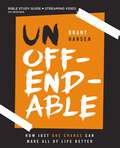
With deadpan humor and refreshing honesty, Brant Hansen will empower you to experience the joy and freedom of becoming unoffendable.Whether…
you're scrolling through social media, sitting around the dinner table, or watching the news, it's wrong not to be offended at the way things are in the world right now—right?!Bestselling author Brant Hansen has a different idea. What if "righteous anger" isn't actually biblical? What if anger isn't an effective response to injustice anyway? God does not need you to be angry. Instead, Christ calls us to do something radical and countercultural: Let go of your anger and forgive.In this six-session video Bible study (video access included), Hansen shares practical ways and biblical reasons to let go of anger and your "right" to be offended. Being unoffendable is a choice, and one that will help you flourish in the way God intended.Sessions and video run times:The Myth of Righteous Anger (18:00)What Humans Are Like (18:00)The Physiological Effects of Anger (18:00)What About Injustice? (18:00)How to Actually Do This (17:30)The Difference It Makes (18:00) This study guide has everything you need for a full Bible study experience, including:The study guide itself--with discussion and reflection questions, video notes, and a leader's guide.An individual access code to stream all video sessions online. (DVD also sold separately)Streaming video access code included. Access code subject to expiration after 12/31/2027. Code may be redeemed only by the recipient of this package. Code may not be transferred or sold separately from this package. Internet connection required. Void where prohibited, taxed, or restricted by law. Additional offer details inside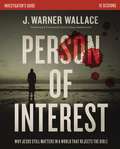
Person of Interest Investigator's Guide: Why Jesus Still Matters in a World that Rejects the Bible
Par J. Warner Wallace. 2021
Imagine investigating a murder in which there was no crime scene, no physical evidence, and no victim's body. How would…
you identify a person of interest in such a case?Designed to be used alongside Person of Interest and the Person of Interest Video Study, this study guide will teach you the same investigative strategies used by detective J. Warner Wallace to examine the claims of history.Dateline featured cold-case detective and bestselling author, J. Warner Wallace, has investigated a number of these "no body missing person" cases and has successfully identified and convicted the killers, even without the victim's body or evidence from the crime scene.Can the historicity of Jesus be investigated in the same way? Can the truth about Jesus be uncovered even without a body or a crime scene? In Person of Interest, Wallace describes his own personal investigative journey from atheism to Christianity, as he employs a unique investigative strategy to confirm the historicity and deity of Jesus--without relying on the New Testament manuscripts.Imagine a scenario in which every New Testament document has been destroyed, Wallace carefully sifts through the evidence from history alone to reconstruct the identity of Jesus as the world's most important person of interest.Person of Interest will:Invite readers into the life of a cold-case detective as he uncovers the truth about Jesus, using the same approach he also employs to solve a real murder caseTeach readers how to become good detectives, using an innovative and unique "'fuse' and 'fallout'" investigative strategy they can also use to examine other claims of historyHelp readers to explore common objections to ChristianityConcrete, compelling, and unique in its approach, Person of Interest will strengthen the faith of believers, while engaging those who are skeptical and distrusting of the New Testament.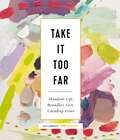
Take It Too Far: Abundant Life, Boundless Love, Unending Grace
Par Jess Connolly. 2020
Does the fear of failing hold you back? Do you ever find yourself hesitant to use your gifts because you&’re…
afraid you&’ll fail? Bestselling author Jess Connolly offers you 100 devotions that challenge women to Take It Too Far in all the good stuff--worship, service, love, forgiveness, and more--as they bring their full selves, gifts, and voices to everything they do.Several years ago, Jess began using the phrase &“take it too far&” as a motto for her spiritual life. She found that those four words freed her to recognize and use her God-given gifts to serve others. In this beautiful devotional for women, Jess:Explores topics such as peace, rest, purpose, hope, wonder, discipline, and courageShares 100 entries that include a Scripture verse, personal reflections, and a conclusion that shows you how you can take it too far todayThis is a great self-purchase for anyone wanting an abundant life, boundless love, and unending grace. Take It Too Far makes a perfect gift for birthdays, Mother&’s Day, Galentine&’s Day, Christmas, or anyone looking to deepen their faith. Inside you&’ll find a:presentation page for easy and thoughtful giftingtable of contents for quick referenceheartfelt foreword from Jess&’s husband Nick Connollybeautiful two-color interiorWith the Holy Spirit&’s guidance and Jess&’s freeing charge, you will be inspired to bring your full self, gifts, and voice to your work, family, and relationships. The possibilities are endless when you tell God you&’re ready to Take It Too Far.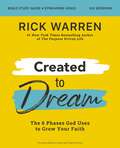
God's Dream for Your Life Awaits You.A great dream is a statement of faith. Whether you dream of creating something…
beautiful or accomplishing something incredible, your dream is the first step God uses to develop your spiritual maturity and change your life. The Bible is full of stories of people whose God-given dreams became reality—but to get there, they had to take a journey of faith.In this 6-session video Bible Study (streaming code included), Rick Warren reveals how God uses six phases to develop your spiritual maturity while fulfilling the dreams God gives you.Sessions and video run times:How Faith and Dreaming Are Connected (25:30)Discovering God&’s Dream for You (25:30)Making Wise Decisions (22:00)Persisting Through Delays (24:00)Dealing with Difficulties (28:00)From Dead Ends to Deliverance (25:30) This study guide has everything you need for a full Bible study experience, including:The study guide itself—with discussion and reflection questions, video notes, and a leader's guide.An individual access code to stream all video sessions online. (You don&’t need to buy a DVD!)Streaming video access code included. Access code subject to expiration after 12/31/2028. Code may be redeemed only by the recipient of this package. Code may not be transferred or sold separately from this package. Internet connection required. Void where prohibited, taxed, or restricted by law. Additional offer details inside.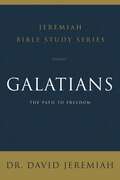
Galatians: The Path to Freedom (Jeremiah Bible Study Series)
Par Dr David Jeremiah. 2019
God's grace cannot be earned...Follow Dr. Jeremiah through the letter of Galatians in a chapter-by-chapter study that will help you…
understand what it meant to the people at the time it was written, and what it means to Christians today. Paul's letter is written to those who had been deceived into believing they had to practice the laws of the Old Testament to receive salvation. Paul is adamant that God's grace cannot be earned, regardless of how many commandments we try to obey. Only our faith in Jesus provides the way to eternal life. "Man is not justified by the works of the law but by faith in Jesus Christ...for by the works of the law no flesh shall be justified" (Galatians 2:16).This knowledge gives us freedom from the pressure of trying to be "good enough" for God.Each of this study's twelve lessons is clearly organized to include:Getting Started: An opening question to introduce you to the lesson.Setting the Stage: A short reflection to explain the context of the study.Exploring the Text: The Scripture reading for the lesson with related study questions.Reviewing the Story: Questions to help you identify key points in the reading.Applying the Message: Questions to help you apply the key ideas to their lives.Reflecting on the Meaning: A closing reflection on the key teachings in the lesson.—ABOUT THE SERIES—The Jeremiah Bible Study Series captures Dr. David Jeremiah's forty-plus years of commitment in teaching the Word of God. In each study, you'll gain insights into the text, identify key stories and themes, and be challenged to apply the truths you uncover to your life. By the end of each study, you'll come away with a clear and memorable understanding of that Bible book.Each study also contains a Leader's Guide.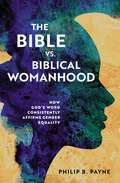
The Bible vs. Biblical Womanhood: How God's Word Consistently Affirms Gender Equality
Par Philip Barton Payne. 2023
A biblical defense of egalitarianism that relies on Scripture to affirm gender equality in the church and in the home."Biblical…
womanhood" is the idea that the Bible teaches God-ordained male leadership and female submission in the home and subordination in the church. Some say this hierarchy of authority is sufficiently evidenced by examples of male leadership (and lack of female leadership) in the Bible: the first human was male, Israel's official priests were male, most authors of Scripture were male, Jesus was male and chose twelve male Apostles. God is addressed as Father. Wives are commanded to submit to their husbands.In The Bible vs. Biblical Womanhood, New Testament scholar Philip B. Payne argues that the very Bible passages that are often believed to teach male headship and female subordination actually teach gender equality. He demonstrates that the Bible does not endorse gender hierarchy but instead emphasizes:The Holy Spirit gifting all believers for ministryThe oneness of the body of Christ (the church) and the priesthood of all believersHumility, service, and mutual submission required of all believersFreedom and willingness to relinquish freedom in order to spread the gospelThese concepts are examined in 14 Bible passages throughout the Old and New Testaments, using careful exploration of Greek and Hebrew word meanings, historical and cultural context, and examples from Scripture. Payne defends his position by providing detailed answers to common objections at the end of each chapter.The Bible vs. Biblical Womanhood is for those struggling to reconcile the Bible's seemingly contradictory teachings about man and woman. Readers will come away with greater confidence in the reliability of Scripture's consistent, harmonious message of gender equality.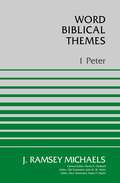
1 Peter (Word Biblical Themes)
Par J. Ramsey Michaels. 1989
A companion series to the acclaimed Word Biblical CommentaryFinding the great themes of the books of the Bible is essential…
to the study of God's Word and to the preaching and teaching of its truths. These themes and ideas are often like precious gems: they lie beneath the surface and can only be discovered with some difficulty. While commentaries are useful for helping readers understand the content of a verse or chapter, they are not usually designed to help the reader to trace important subjects systematically within a given book a Scripture.The Word Biblical Themes series helps readers discover the important themes of a book of the Bible. This series distills the theological essence of a given book of Scripture and serves it up in ways that enrich the preaching, teaching, worship, and discipleship of God's people. Volumes in this series:Written by top biblical scholarsFeature authors who wrote on the same book of the Bible for the Word Biblical Commentary seriesDistill deep and focused study on a biblical book into the most important themes and practical applications of themGive reader&’s an ability to see the "big picture" of a book of the Bible by understanding what topics and concerns were most important to the biblical writersHelp address pressing issues in the church today by showing readers see how the biblical writers approached similar issues in their dayIdeal for sermon preparation and for other teaching in the church Word Biblical Themes are an ideal resource for any reader who has used and benefited from the Word Biblical Commentary series, and will help pastors, bible teachers, and students as they seek to understand and apply God&’s word to their ministry and learning.
Out Of The Shadows And Into The Light: The Exodus as a Pattern for Discipleship
Par W. J. Thomas III. 2020
This book uses the study of types and shadows to decipher the events of the larger Exodus story (slavery through…
the Promised Land). The material will lead the reader out of the shadows of the Old Testament into the light of the New Testament fulfillments. The purpose of this material is to challenge the reader&’s understanding of the way these events have traditionally been interpreted. Alternate interpretations will be presented with accompanying reasons and scriptures.The chapters are intended to take snapshots of the six major events comprising the Exodus. They will be organized according to the following headings. The Journey out of Bondage will encompass chapters 1-3, slavery in Egypt, the establishment of the Passover, and crossing the Red Sea; The Journey in the Wilderness contains only one chapter, 4; and The Journey into Promise will complete our investigation of the Exodus story by viewing the last two events, crossing the Jordan River and entering the Promised land, chapters 5 and 6 respectively.Some chapters need an additional explanation on a particular point; an excursus is provided to promote clarity. At the end of each chapter is a Discipleship Challenge with which the reader is asked to personally apply the principles presented. A study guide is also provided for those who wish to use this material in a small/cell/life group atmosphere.